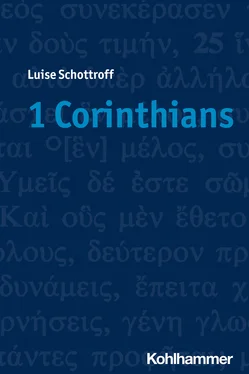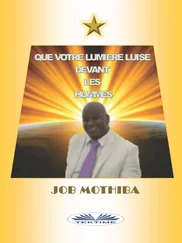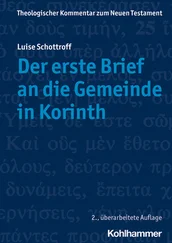1. When people meet God »face to face« (13:12), this encounter changes them into new creatures. Everything that one longs for from God’s future is already happening now—in the midst of the world ruled by death and by the authority of the powers. Maturity is not a status people have, 146but an unendingly rich experience of happiness and liberation. It is the direct experience of God’s care (2:9; 13:2) for those who love God.
2. In 2:9 the second dimension of maturity comes into view. Love for God expresses itself in doing the will of God. It is the Torah as the will of God, as that which is mature (Rom 12:2), that brings about maturity. In the Sermon on the Mount is a statement in full accord with this aspect of the issue: »Now, be perfect, as your heavenly Father is perfect« (Matt 5:48). The Torah makes it possible to imitate God in that humans in their actions model God’s actions. The Babylonian Talmud elucidates this aspect of perfection:
R. Hama son of R. Hanina further said: What means the text [Deut 13:5]: Ye shall walk after the Lord your God? 4 Is it, then, possible for a human being to walk after the Shechinah; for has it not been said: For the Lord thy God is a devouring fire? 5 But [the meaning is] to walk after the attributes of the Holy One, blessed be He. As He clothes the naked, … 6 so do thou also clothe the naked. The Holy One, blessed be He, visited the sick, … 7 so do thou also visit the sick (bSota 14a). 147
In 2:7the divine wisdom, which is revealed to the mature in the encounter with God, is called, »hidden in a mystery« (cf. 14:2). The content of the revelation is the eschatological mystery in the sense of 14:1; 13:2; 15:51; cf. Rom 11:25, 33. The mysteryis God’s own self and God’s action in the past, present and future. 148In the encounter with God the mystery of God is revealed in such a way that paths into the future are opened for those who see and hear. The mysteries are hidden, but God reveals them to those who love God. They receive the pneuma , the Spirit, which gives them eyes and ears for God.
In Rom 11:33–36 there is a hymn of praise to God and God’s hiddenness that is related in content. 1 Cor 2:9, 10 can also be understood as words of praise. No one can make God an object of investigation, God makes God’s-self known, providing the Spirit’s power and the understanding ( nous ) for this (2:16). The content of the lalein of the wisdom of God can be filled in by Rom 11:33: »What immeasurable riches of God, what deep wisdom and inexhaustible knowledge …« That is language about the mystery of God that can be sung and prayed.
The wisdom of God is expressed again a second time in 2:7b as an encounter with God, using two quite emphatic thoughts: from eternity God decreed it would go to its recipients, and it thereby enables people to share God’s doxa ( kavod ), divine splendor, God’s presence, God’s very Self; 149(on 2:8b, cf. Rom 8:29).
2:8The rulers of this age, whose power has already been broken by God (see 2:6), are the authorities and rulers responsible for Jesus’ crucifixion (see above on 1:18). But these political rulers are merely the visible players in a network of power and destruction that Paul and many people of his time can also ascribe to demonic powers. Political structures reveal mythic dimensions and, thereby, their structural might. The word aiōn encompasses time and space as power structures that God opposes. That the rulers crucified Jesus shows how far the present ruling structures are from God. The Roman Empire is analyzed in 2:8 as a system of violence (on this see above, the basic information »The wisdom of this world« before 1:18). At the same time, the limit God has set for this system becomes visible. The fact that the Crucified One is called the kyrios tēs doxēs emphasizes the same thought found in 1 Cor 8:5–6: there is one kyrios , who sets limits for the lords of this world. In him God is present (cf. 2 Cor. 4:6). 150God’s doxa provides the qualifications for this kyrios , distinguishing him from all the other kyrioi of this world. The genitive is genitive of quality. 151As the Risen One, this kyrios has enabled believers to participate in the divine presence. There is no allusion here to kyrios tēs doxēs as an attribute of God (which is found, above all, in 1 Enoch 22.14 and more frequently). It is not a question of ascribing divinity to Christ.
In 2:9Paul is quoting from Scripture, but the citation has not been identified. 152 2:10aSo its origin is unknown. And yet Paul has fully integrated its content and language into the context: the principal clause is in 2:10a, and the citation specifies the object of divine revelation: »That which no eye has seen …, God has revealed … to us.«
In 2:10b–15 Paul writes a brief discourse about the pneuma /the Spirit. 2:10b:The Spirit is given to us by God so that we can encounter God (on mystērion /mystery, see 2:7 above).
2:11elucidates, through the understanding one person has of another, the equality with God that has been given, which makes knowing God possible.
2:12contrasts the spirit of the world with the Spirit that comes from God; compare the distinction between the wisdom that comes from God and that from the rulers of this age, 2:6–7. On the practical consequences of such a distinction, see the basic information »The wisdom of this world« before 1:18.
2:12b: the power of God’s Spirit makes us able to recognize the gifts of God: liberation through the Messiah, who makes the new life as the body of Christ possible.
2:13The Spirit is the teacher of a new language (see on 1:5). To this new language belongs the ability to interpret Spirit-imparted seeing, hearing and lalein , translating it into understandable language or into the situation one is experiencing. The word sygkrinein , which I am translating by »interpret,« is often translated by »compare,« »examine« or similar words. One assumed that ecstatic utterances and prophesies had to be subjected to a critical testing by making comparisons (for example, »in that we test the spiritual by what is spiritual« 153). This is correctly criticized by Dautzenberg: »This is really a strange view, assuming that a Proto-Inquisition was already underway in the Pauline congregations.« 154Dautzenberg has put forward extensive and for me convincing arguments for translating sygkrinein (and diakrinein / diakrisis in 12:10; 14:29) as »interpret.« 155I resolve the problem of whether the dative plural pneumatikois is neuter or an anthropocentric masculine by choosing the latter, in the light of 2:14–15: the interpretation is directed to »the people who are filled with the Spirit.«
2:14speaks of psychikoi . This term has led to the question of whether Paul’s concept of humanity is dualistic: the psychē classifies humans negatively, and it is only the pneuma that makes them people who are in relationship with God. But the »physical« body is for Paul the body/person created by God (see 1 Cor 15:44–45); 156and the spiritual body/person is the one who is raised into a new life in the midst of the experiences of violence and humiliation in daily life. »When Paul speaks about resurrection, he has these tangible bodies in mind. He assures these mangled, despised, tormented bodies that they are very valuable, temples of the sacred power of the Spirit … (cf. 1 Cor 6:19).« 157
In 2:14b and 15 Paul uses the word anakrinein three times. The discernment ( anakrinein ) effected by the Spirit is lacking in people who are not reached by God’s call (2:14). For that reason, they consider the power of God’s Spirit and the resurrection of one crucified (see 1:18) to be foolish, to be idiotic.
Читать дальше












